Education and Professional Training
Participation through education
More than 700 million people live in extreme poverty, many of them in rural areas. Large parts of the people in rural areas live from farming and animal husbandry. Surpluses are sold, yet income is often very low. When "new technologies" come to the village, the villagers should also benefit economically. This requires education and professional training.
This area has increasingly become the centre of our activities over the last four years. A large part of our budget is channelled into pre-school and school education as well as vocational training.
Due to the already small land size of the farmers, it is clear that not all children who grow up in the countryside will be able to work in agriculture. We therefore have a dual strategy: we support those who are currently working in agriculture or will do so in the future with training and infrastructure to improve yields and income from agriculture. At the same time, we help those who cannot or do not want to work in agriculture due to a lack of land. As Rwanda is rapidly digitalising and focusing on tourism, major international conferences and business process outsourcing, a command of the English language and a solid knowledge of information technology are important skills.
Construction of a new kindergarten
The kindergarten we built in the village of Rugarama is now hosting over 250 children, who are looked after by six teachers. Most of the children admitted had previously had no opportunity to attend such an institution. It is particularly important that the children receive a warm meal at lunchtime.

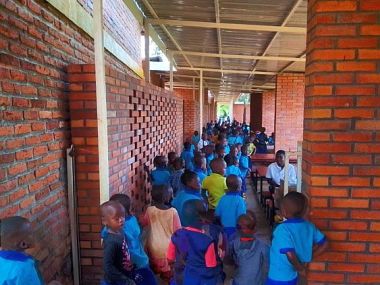
Electrification of schools, construction of ‘smart classrooms’, teacher training in IT and English
Our current project area has ten schools, five of which were not electrified. We have equipped three of these schools, all of which are primary schools with classes 1 to 6, with AC solar systems and sufficient battery storage. The power supply is at least as reliable as in the capital. The three schools now also each have a computer classroom with modern Windows laptops. The teachers are taught IT and English by our trainers. All three schools now also offer IT lessons for pupils in years 4 to 6. We also support a debating club in English language at a nearby secondary school.
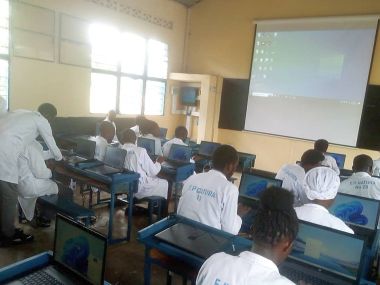
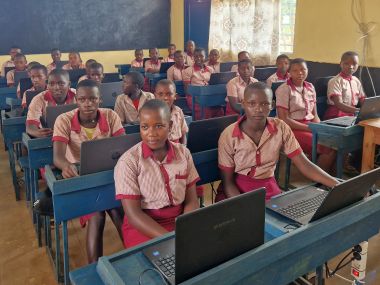
Expansion of a vocational school, equipping two classrooms with IT
The sector vocational school founded last year in the market town of Kabukuba is setting up two new three-year training programmes: software development and IT network technology. The training is based on the dual system like in Germany: students alternate between learning at school and in a company. We are supporting the construction of four new classrooms and the equipping of two classrooms with modern Windows computers.
Scholarships for attending a vocational school
Attending a vocational school costs money that many families cannot afford. In addition, vocational schools are usually too far away from home. It is therefore necessary to attend a boarding school. For the first time in 2023, we have awarded four scholarships for one year's attendance at a vocational school. In 2024, five scholarships were awarded, four of them for a three-year course. The target group is young women and men who have done well in the national exam but whose families lack the money to pay for vocational school. We support the scholarship holders during their training and later help them to find internships and then a job.
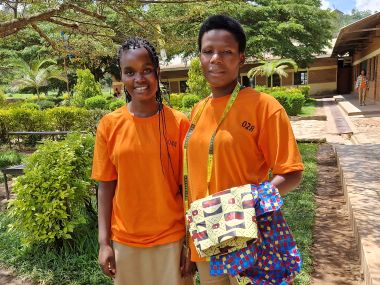
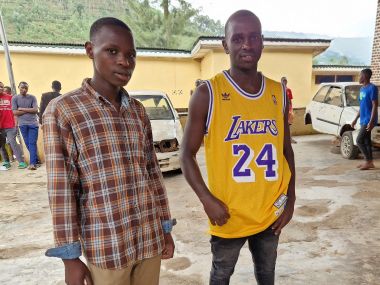
Alphabetisation trainings for adults
Around 30% of adults in our project area cannot read or write. Together with local primary schools, we offer literacy training for adults. They are very well attended.
Agricultural training
Our experienced trainer organises training courses for small holder farmers in agro-ecological cultivation techniques. Topics include the production of compost, liquid fertiliser and insecticides from natural and locally available resources.


The training participants are each given a goat or a sheep. Trial systems for drip irrigation are also operated. The training courses run for ten months.
All our fields of action
News Education

New school building with two smart classrooms inaugurated!
18 February 2025
New school building with two smart classrooms inaugurated!
We have built a new building for the Juru Vocational School with two smart classrooms and two seminar rooms.

Learn programming among banana fields!
22 January 2025
Learn programming among banana fields!
Together with the training center “The Gym,” we are training young people in “coding clubs” at the Juru Vocational School to develop software.

Ambassador and Mayor inaugurate drinking water facility!
9 December 2024
Ambassador and Mayor inaugurate drinking water facility!
Immediately after the visit to the vocational school, the German Ambassador and the Bugesera Cistrict Mayor inaugurated a drinking water system at Cyirabo Primary School.

The German Ambassador visits new computer classrooms!
9 Dezember 2024
The German ambassador visits new computer classrooms!
The German Ambassador to Rwanda, Heike Uta Dettmann, has visited the new IT classrooms at the TSS Juru vocational school in Bugesera.

The 2024 scholarship programme launched!
9 September 2024
The 2024 scholarship programme launched!
In 2024, we awarded four vocational school scholarships to attend Akagera International School. Two in tourism and two in IT.

New building for nursery school in Rugarama Village
26 April 2024
New building for nursery school in Rugarama Village!
A new modern brick building was added to the one classroom nursery school we built last year.
22 December 2023 Gatora Primary School has electricity and smart classroom now
01 September 2023 Funding commitment for the electrification of the Gatora primary school received
11 August 2023 Electrification of Cyirabo Primary School completed
30 June 2023 English training is extremely popular
11 May 2023 One goat or one sheep for each farmer
03 April 2023 Grand opening of the kindergarten
17 March 2023 Great progress in agricultural training
24 February 2023 IT training of teachers is progressing well
31 January 2023 Two more primary schools are to be electrified
14 December 2022 Training of 50 farmers started!
14 October 2022 "Smart Classroom" set up!
06 October 2022 Construction of the nursery school has started!
09 September 2022 The primary school now has solar power!
20 July 2022 Memorandum of Understanding for construction of a nursery school signed
11 August 2021 The school has water again




